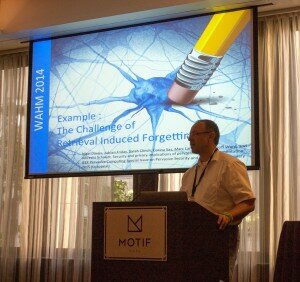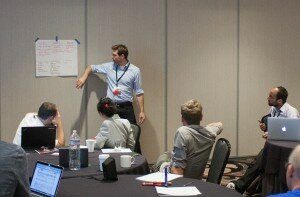Recall researchers Tilman Dingler, Nigel Davies, Albrecht Schmidt, Marc Langheinrich and Neils Henze recently collaborated with Kai Kunze (Osaka Prefecture University) to organise the WAHM Workshop on ubiquitous technologies for Augmenting the Human Mind. The workshop took place on September 14th in Seattle as part of the 2014 ACM International Joint Conference on Pervasive and Ubiquitous Computing (Ubicomp ’14).
WAHM brought together researchers and practitioners at the intersection of technology and cognitive psychology to explore current research and future visions for the augmentation of human memory and cognition. Over the course of the day a total of 9 research and position papers were presented, and a series of discussions explored key aspects of the research agenda.

Following an opening presentation from the organisers, the remainder of the morning was comprised of two paper sessions. The 9 five-minute talks included papers on both capturing memories (e.g. activity recognition, image capture) and the subsequent visualisation of captured data (e.g. through augmented reality overlays on real-world objects).
In addition to covering a wide range of technologies, many of the research topics presented were grounded in psychological theory — for example, Yao Wang (Virginia Tech) presented work that explored the role of principles from cognitive psychology, particularly that of prospective memory, in improving location-based reminder systems; and Sarah Clinch (Lancaster University) presented work that motivated a need for third-person lifelogging technologies based on psychological literature regarding viewpoints in human memory.

The afternoon discussion sessions explored key areas of interest for future research in the area of memory augmentation. Groups explored key challenges and motivations around a range of significant issues including: querying and indexing, capture technologies, and changing motivation and memory augmentation needs as a population ages.
As a closing activity, the workshop participants were encouraged to identify exciting areas of future research in the area of memory and cognition augmentation. The quantity and breadth of these ideas, ranging from short-term student projects to larger-scale multi-year investigations, illustrate the exciting nature of this research topic.
The WAHM workshop proceedings can be found online, here.